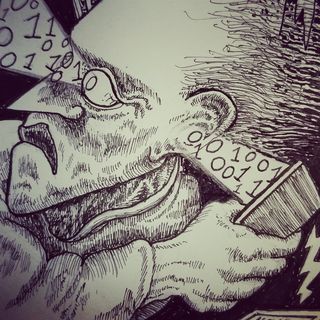Coronavirus Disease 2019
Tuning Out the Noise: An Expedition into Data Silence
Even before Covid-19, I tried self-isolating from informational stress.
Posted March 18, 2020 Reviewed by Gary Drevitch

As the novel coronavirus forces more of us to stay home and, presumably, spend more time communicating online, we have two options that are not mutually exclusive: First, to increase and finetune our online relationships, which is certainly the kind of existence we are evolving into, with or without the plague. Or, we can investigate ways to vaccinate ourselves against the dehumanization involved in virtual life, by cutting down—or sometimes shutting down altogether—the informational noise that is daily growing exponentially louder in our consciousness.
Informational noise, aka data smog or data overload, of which online life is a huge part, is not quite the same as physical noise, but its harmful effects can be similar.
Physical noise pervades our lives and harms us. European studies indicate that a quarter of Europe's population—125 million people—experience noise above the threshold considered safe, resulting in 10,000 premature deaths every year. A National Institutes of Health study demonstrates the relationship between excessive noise and high blood pressure. Yet relatively few of us are conscious of the damage noise does, and even fewer take steps to mitigate it.
Even fewer realize that the sensory overload caused by informational noise can be harmful as well. Consider a typical American's daily routine: breakfast with TV, radio ads, smartphone, email; eight hours of employment at a computer workstation, with more emails, text messages and social media insterspersed; ads and news blasting during the commute; an evening spent emailing, texting, Instagramming, watching streamed entertainment or playing video games.
A 2018 study showed the typical American spends eleven hours a day interacting with screens, up an hour and a half from 2014: this is now the primary activity of our lives. A Tohoku University study indicated that constant arousal, anger and frustration result from the sensory overload caused by a typical load of informational noise, almost all of it electronic. A 2015 study showed one third of people surveyed felt stressed by data overload. As with physical noise, stress leads to higher doses of cortisol and other hormones detrimental to our cardiac health.
I'm not sure if I am particularly vulnerable to the ill effects of informational noise but for a long time I vowed I would try–as an antidote—to spend a week without any electronic input of any kind, in a quiet village where I'd not be exposed to much unwanted input such as outside adverts and physical noise.
It took me a while to arrange. My work as a writer and teacher involves much use of email and search engines. I was particularly nervous, as the father of two children--both in their twenties, but they're still my kids, and I wanted to be available just in case--about cutting off all contact with the outside world. I sent my family the phone numbers of friends living nearby, in a house I had bought earlier in a village near where I was born.
Finally, in mid-January, I turned off my phone and laptop, unplugged the wifi, and hid the TV remote in a drawer. Here is my diary of that week (please note this is not a scientific, double-blind experiment, but a personal experience that will suggest areas of further research):
Day 1: The data-junkie reflexes—check phone, listen to radio, turn on music—seem to multiply exponentially as I do not satisfy them. The feeling of stretching time: a drawing out of time-not-taken-up, by emails, social media, etc.; is gobsmacking in its intensity. My buddy Dana shows up, says, "You realize you're putting the burden (of communicating) on your friends?"
Day 2: I usually check news feeds on the smartphone before getting up but waking with no cellphone at the bedside actually feels good—a lack of inconsequentiality, depressing developments, news that bears no relevance to my life, histrionic clickbait. I miss the BBC at breakfast though. The cat seems to pay more attention to me: am I more present to the cat? ... At night, not having a Netflix show to watch, I keep working on a short story, read an article or two.
Day 3: Pip (the cat) truly spends more time with me now. Dana, who's one of my emergency contacts, shows up with "emergency" news that the family bank account is overdrawn. He argues that I am substituting a personal information network for my online network so what's the point? I tell him that seeing friends like him more often is a good part of the point. But maybe, he says—joking, mostly--your friends will tire of visiting. ... I buy the print New York Times at the village grocery, something I never do ordinarily; I write, "Seeing the print run down the page between my hands was both more pleasant to read—no backlight—and allowed me to retain it better because it was not so evanescent, so destabilized by the news that was waiting, infinite and changing, with the next click online. ..."
[Days 4 through 7, as well as the applications of this and similar data to social distancing and self-isolating due to Covid-19, will be covered in the next post.)




